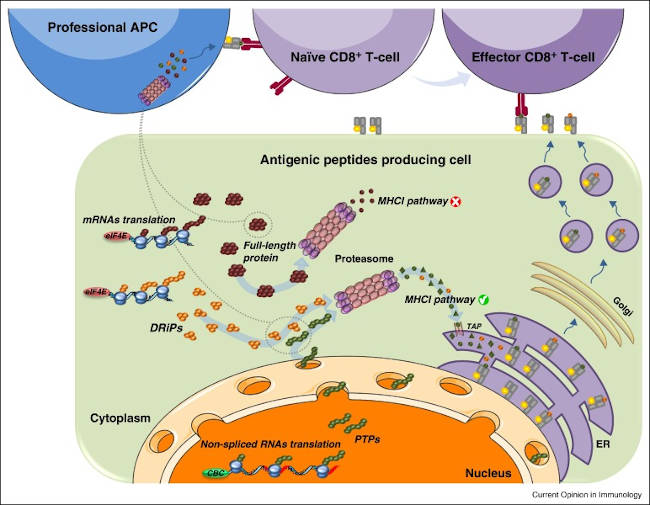Non-conventionnals epitopes cancer immune responses
This group belongs to the UMR 1015 "Tumour Immunology and anti-cancer immunotherapy".
Scientific context
Immunotherapy is currently one of the most promising lines of research in oncology. Unlike standard treatments, such as chemotherapy, which target directly the tumor by inducing apoptosis of tumor cells, immunotherapy consists of stimulating the immune system with various treatments in order to allow it to fight tumor cells. The aim of this approach is to educate and strengthen the immune system against cancer.
Antibodies targeting the different immune checkpoints are now succeeding in stemming the progression of extremely aggressive tumors against which, until then, there were only few therapeutic solutions. Immunotherapy is therefore an additional weapon in the therapeutic arsenal of anti-cancer treatments.
Gustave Roussy's teams are actively involved in the emergence of immunotherapy by working on both basic and clinical research programs.
Abstract of the project
The current strategies to control cancer development, in addition to targeting the cancer cells itself, tend to take advantage of the immune system. In order to help the immune system to recognize and fight the tumor, it is important to identify the antigens presented specifically by cancer cells at the cell surface. Certain antigens have already been targeted as part of a therapeutic cancer vaccine in order to stimulate recognition of the tumor by specific T lymphocytes. However, cancer cells develop resistance strategies to minimize the effect of the immune system on their development process.
We recently reported the important role of certain unconventional tumor antigens, also called PTPs (Pioneer translation products) in triggering the activation of specific CD8 + T cells lymphocytes via a cross presentation pathway. Since then, it has become important for us to demonstrate how PTPs can be a source of neo-antigens for the development of therapeutic cancer vaccines.
One of the strategies implemented by tumor cells is to reduce the number of antigens they present on their surface. Our recent work has enabled us to identify on the one hand the repertoire of specific antigens presented by tumor cells also called immunopeptidome and on the other hand a natural compound allowing to increase the presentation of these antigens on the surface of cancer cells , making them more detectable.
In one of the project of my lab, supported by the SATT Paris Saclay, we were able to demonstrate that the vaccination of mice with unconventional epitopes, originating from the repertoire of epitopes found on the cell surface of cancer cells, can induce a specific activation of specific T lymphocytes with for consequences of a tumor growth defect. Our objective is to develop a technological platform to identify unconventional tumor epitopes which may be unique or shared between different types of cancer and which may be targeted in the context of peptides-based cancer vaccines.
In addition, we are working closely with a team at is specialized in the chemistry of therapeutic molecules from Chatenay-Malabry’s faculty in order to modify these different natural compounds to make them as effective as possible in activating our defenses against cancer cells. These different compounds modify the immunopeptidome on the surface of cancer cells. Indeed, these treatments make it possible to quantitatively modify certain epitopes on the surface but also qualitatively by allowing the production of new antigens (neo-antigens) on the cell surface. Therefore it will be conceivable to produce a peptide cancer vaccine based on these neo-antigens. Hence, we wish to continue testing these new compounds as new therapies and imagine in the near future that we will be able to combine these synthetic molecules with a peptide vaccine to positively regulate the anti-cancer immune response.
Main objectives
The different aims of the team focus on:
1) The development of a peptide cancer vaccine
2) The identification and development of new compounds that can improve the anti-tumor immune response.
For both projects we have to assess the peptide vaccine and the compounds for their capability to induce the immune system in an animal model (mouse). We have also to analyze the different toxicity parameters, study the pharmacokinetic parameters, assess the stability of the molecules, set up large-scale synthesis in order to enter into clinic phases.
The ultimate goal is to create a portfolio of peptide vaccines and synthetic anti-cancer chemicals to help the immune system to recognize and eliminate cancer cells. The idea is to create a start-up with the help of Gustave Roussy Transfert to develop these tools more quickly.
Innovative ideas of the projects
We aim to develop better treatments against cancers such as cancer vaccines composed of non-conventional epitopes associated with new chemotherapeutic treatments thanks to the discovery of new synthetic anti-cancer compounds.
Valorisation of the projects
Since 2015, we have published 3 articles and 4 patents: 1 of them relates to a peptide anti-cancer vaccine and 3 of them to natural or synthetic compounds inhibiting a cellular protein complex. We wish to use them in the near future as anti-cancer immunomodulators.

